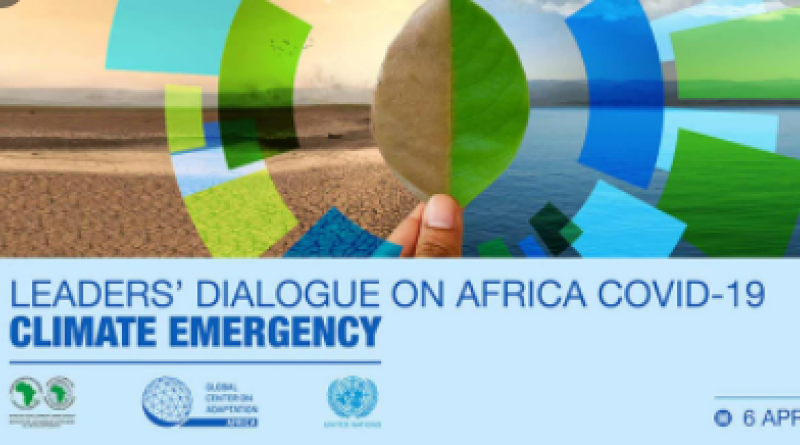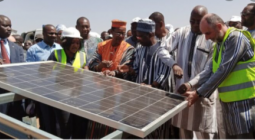Remarks at the Leaders’ Dialogue on the Africa COVID-Climate Emergency: Delivering the Africa Adaptation Acceleration Programme

Thank you very much. Excellencies,
I thank the African Development Bank and the Global Center for Adaption for convening us today.
As the world confronts a pandemic, a recession and a climate crisis, the United Nations climate conference, COP26, in November, provides a compelling opportunity for Africa to turn ambition into reality.
In that context, it is clear that we need a breakthrough on adaptation – and I would like to highlight five imperatives for that to be possible:
First, I have asked all G7 members and other developed countries, as well as Multilateral and National Development Banks, to increase the share of climate finance allocated to adaptation and resilience to at least 50 per cent of their total climate finance. Today adaptation and resilience finance accounts for a mere 20 per cent of total climate finance flows.
Second, I am calling on all governments and businesses to integrate climate risks into policies and investment decisions, including budget and procurement. Developing countries must be furnished with the tools and means to achieve this. Accurate and up-to-date risk information is the critical first step for effective risk management.
Third, we must scale up catastrophe-triggered financial instruments such as risk pooling mechanisms. The Africa Risk Capacity merits more investment.
Fourth, bilateral and multilateral partners must scale up support to regional adaptation and resilience initiatives, such as the Great Green Wall Initiative and the Sahel and Congo Basin Commissions.
Finally, and fifth, I ask that by COP26, we have concrete proposals on the table to make access to climate finance easier and faster, including for African nations.
Support for climate adaptation in Africa is crucial. I encourage all international partners to come forward with pledges to support the African Adaptation Acceleration Program.
African countries continue to contribute little to global emissions, so deep is the continent’s energy poverty. Yet Africa is on the front lines of dramatic climate impacts, from floods to cyclones and drought that can wipe out decades of development gains overnight.
The COVID-19 pandemic has reminded us that we cannot afford to ignore known risks. We need large-scale, risk-informed, preventive and systematic adaptation efforts to protect people and communities, and to build a high-resilience future.
Yet, one in three people are not adequately covered by early warning systems. Global coverage, along with sustainable infrastructure and other steps, can give the world a double dividend: avoiding future losses and generating economic gains. The Global Commission on Adaptation found that every $1 invested in adaptation could yield almost $4 in benefits.
Adaptation must not be the neglected half of the climate equation.
I continue to call on the G20 countries and main emitters to lead the way with new and more ambitious Nationally Determined Contributions laying out concrete actions and policies for the next 10 years, building a global coalition to achieve net zero greenhouse emissions by 2050, in line with the objective to limit global temperature rise to no more than 1.5 degrees Celsius.
I am also urging all countries to align their COVID-19 recovery packages with the Sustainable Development Goals and the Paris Agreement.
We have a once-in-a-generation opportunity to chart a new global development path.
The current model is not delivering.
Market dynamics have changed profoundly.
In 2020, funding for renewables and energy efficiency was four times greater than for fossil energy.
Renewable energy solutions employ more than 10,000 formal workers in Kenya – and that number is expected to grow another 70 per cent over the next two years.
Yet only 2 per cent of global renewable energy investments in the past decade have gone to Africa, to just a few countries, even though the continent has abundant and untapped renewable resources.
The old models of development and energy use have failed to provide universal energy access to Africans.
Hundreds of millions of people still struggle every day because they lack reliable and affordable access to electricity or are cooking with polluting and harmful fuels.
We can provide universal access to energy in Africa primarily through renewable energy. I call for a comprehensive package of support to meet this objective ahead of COP26.
It is achievable. It is necessary. It is overdue. And it is smart: climate action is a US $3 trillion investment opportunity in Africa by 2030.
A just energy transition for Africa is critical -- one that recognizes the unique and special situation and circumstances of Africa, that includes addressing a transitional energy mix.
But we face a major finance gap.
Fourteen per cent of the world’s population lives in sub-Saharan Africa, yet only 3 per cent of global climate finance flows into the region.
The $100 billion commitment made over a decade ago must be delivered. I have asked all G7 nations to double their climate finance support and the share of grants.
Developed countries and main financers must ensure a swift shift of the billions to support African green investments, to increase resilience and to create the conditions for scaled-up private finance.
The private sector must step up and get organized to provide immediate, concrete solutions to governments.
Local authorities can work with unions and community leaders on reskilling and social security nets.
African nations can lead the way by embedding ambitious adaptation and mitigation plans in their updated NDCs.
But first they need to regain their fiscal autonomy.
At the High-Level Event on Debt and Liquidity convened last week, I reiterated my call for an extended moratorium on debt payments, targeted debt relief or cancellation where appropriate, and reform of the international debt architecture.
We need to make sure that the Special Drawing Rights already made available by some countries, or that are soon to be issued, will be applied, providing effective support to the African continent’s sustainable and inclusive recovery.
As the continent that has contributed least to the climate crisis, Africa deserves the strongest possible support and solidarity.
African nations are showing leadership.
The Africa Adaptation Acceleration Program, and many other ambitious African initiatives, must be empowered to fully deliver on their goals.
You can count on my full mobilization. The UN is strongly committed to working with you – and I emphasize the word “with” – to secure the support you need to chart a prosperous and sustainable future.
Thank you.
UNFCC
6 April 2021




